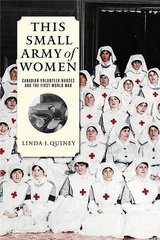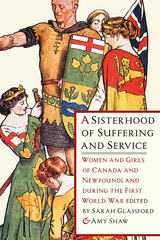
War-Torn Exchanges
The Lives and Letters of Nursing Sisters Laura Holland and Mildred Forbes
In June 1915, Laura Holland and Mildred Forbes sailed from Montreal to serve as nursing sisters in the Great War. In a letter written on the voyage, Mildred promised Laura’s mother, “I will always take the best care I can of Lollie ... I would rather be torpedoed than ... separated.”
This letter, the first of dozens that Laura and Mildred wrote to friends and relatives over the following four years, hints at the nurses’ remarkable friendship. An inseparable duo, they cared for each other through sickness and health, air raids and bombings, unrelenting work and adventurous leaves.
Unfolding like an epistolary novel, these carefully curated and contextualized letters transport readers from the dire conditions of hospitals in Greece to the efficiency of casualty clearing stations in France, from camel rides in Egypt to the royal palaces of Britain. Together, Laura and Mildred’s words offer unprecedented insight into the daily lives of Canada’s First World War nurses, from the privations of Gallipoli to the heavy casualties of Passchendaele and beyond.
Mildred and Laura’s war-torn exchanges challenge the popular myth of nurses as wartime angels. Instead, their letters are filled with the nurses’ fears and frustrations, humour and keen observations, revealing how they relied on friendship, wry wit, and professional ethics to carry on in the face of mismanagement, discrimination, illness, deprivation, and trauma.
This captivating book will be of particular interest to students and scholars of Canadian history, military history, nursing history, and women’s history and gender studies.
Andrea McKenzie provides as indispensable a service to contemporary readers as the women no doubt did for their friends and family during the war. As Mildred exclaimed, in the absence of such accounts, ‘the people at home have no idea what the soldiers [and nurses, we might now add] … went through for them.’
Laura’s letters to her mother and Mildred’s to her friend Cairine Wilson document a side of the war not found in more formal accounts … [and] close the artificial divide between battle front and home front … McKenzie’s narratives, annotations and deft editing … [make] War-Torn Exchanges an insightful contribution to understanding another aspect of the war.
Of this cadre of women most – but not all, for some were killed in action – returned from war. Some became our leaders in nursing, hospital management, and social services. Some left nursing and became our grandmothers or great grandmothers. We are in their debt, for their work and for their legacy. In their articulation of war, framed by diligent writers and researchers like Cynthia Toman [author of Sister Soldiers, UBC Press 2016] and McKenzie, we discover anew, from Canadian nursing sisters in the First World War, just what war is. From such articulation, we have much to learn.
The letters [of Holland and Forbes] document close links between Canada's home and war fronts. Ties taught lessons about the atrocities of combat and, no doubt, helped inspire subsequent anti-war activity and support for refugees … In short, War-Torn Exchanges provides inspiration in plenty for both friendship and engagement.
A vivid, fascinating account of two experienced nurses who served on various fronts during the First World War. Their letters illuminate not only the strength of their personalities and the enduring importance of their close friendship but also the war, its legacies, and its impact on women’s lives.
Introduction: Friendship and War
1 Journeying to War
2 Lemnos: “Poor Souls” and “Pathetic Sights”
3 Alexandria and Cairo: Mosques and Minarets
4 Salonika: In the Shadow of Olympus
5 England: Officers and Honours
6 France: Trauma and Taking Charge
Conclusion and Epilogue
Appendix: Laura Holland’s Travel Diary, 1907
Bibliography; Notes; Index












